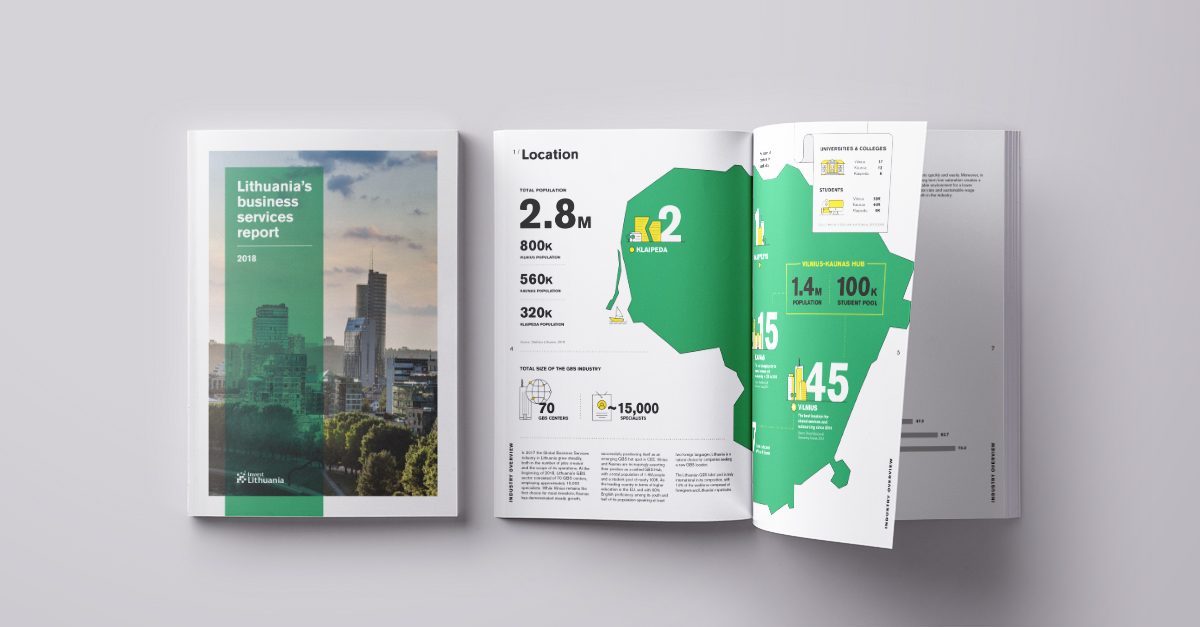New analysis by one of Lithuania’s leading business journals has highlighted promising trends in Lithuania’s Global Business Services (GBS) sector. These include a substantial increase in the number of Lithuanian expatriates returning to the country to work in the sector, a rise in the development and usage of robots in Lithuanian service centres, plus strong overall growth in the sector. According a recent report by the investment development agency Invest Lithuania, in 2017 the GBS market grew by 17%, and is now comprised of 70 centres employing over 15,500 staff.
Verslo Žinios (VŽ), Lithuania’s leading business daily, recently interviewed key players in Lithuania’s GBS sector on the topic of robotics, repatriation and the sector’s current and future growth. The overall view was that the increasing use of Robotic Process Automation (RPA) will help the sector continue to grow without reducing employment levels. Robots help to address today’s challenges, said the respondents, while market growth prospects will largely depend on whether businesses continue to have a need for the services provided by GBS centres.
Developing robots for divisions around the world
According to the Lithuania’s Business Services Report, robots today account for only 2.3% of the workforce in Lithuania’s GBS sector. However, 67% of the centres that took part in the Report are using RPA solutions, with 48% developing these solutions in-house. What’s more, many of the solutions developed and implemented in Lithuania have already earned international recognition within their company groups, highlighting the level of competence these teams offer and the high esteem in which they are held.
Šarūnas Šuipis, Director General of Western Union’s Lithuanian centre, states there are currently 70 robots in operation at the company’s Vilnius office. But crucially this does not mean Lithuanian jobs have been replaced, although it is possible some operations have been taken over from teams in the USA, Argentina and the Philippines.
“Essentially, we are a high competence centre – we automate work processes not only at our centre, but also across the entirety of Western Union,” Mr Šuipis said.
Likewise, Danske Bank’s Vilnius centre, which is the largest centre in Lithuania in terms of the number of employees, has deployed more than 150 robots.
Rosita Vasilkevičiūtė, Manager of the Danske Global Services Centre in Lithuania, told VŽ that the robotisation of repetitive tasks allows her team’s skills in other areas to be leveraged, especially where higher levels of competence are required. And this is a good thing.
“Our staff want to carry out more interesting and meaningful work, and we are able to improve our retention rate and develop their competencies,” Ms Vasilkevičiūtė added.
Ms Vasilkevičiūtė does not see any serious risks of the services portfolio offered by the centre changing next year. In fact, she pointed out that the services offered are likely to become more inter-disciplinary.
Likewise Rūta Jasiulionienė, Manager of SEB’s Global Services Centre in Vilnius, cannot recall a single instance of people being made redundant because of the deployment of robots.
“It simply means that those who are freed from repetitive tasks can use their competences for more complex processes,” Ms Jasiulionienė explained.
More repatriates and foreign nationals employed
Another trend highlighted in the Invest Lithuania Report is the ability of GBS centres to attract international talent. Repatriates account for 10% of those employed in GBS in Lithuania, while 4% of employees are foreign nationals.
According to Ms Vasilkevičiūtė, this trend became pronounced two to three years ago. Danske Bank currently employs over 200 Lithuanian repatriates, and Ms Vasilkevičiūtė maintains that interest in returning to Lithuania is definitely on the up. Those abroad understand that Lithuania has changed and is now full of interesting career prospects, including jobs at major international companies.
“Some time ago in Copenhagen we invited Lithuanians studying and living in Denmark to meet us and talk about the opportunities on offer. In the end we didn’t have enough space for all the people who turned up. So, there is huge interest,” the manager of Danske’s Lithuanian office said.
According to Mr Šuipis, Lithuanians who studied abroad and acquired experience at international companies are happy to be employed at the Western Union centre in Vilnius “because they can use their expertise and experience, plus they feel good here. International business culture has made Lithuania an attractive place to live and work,’ Mr Šuipis said.
Further growth next year
Ms Jasiulionienė predicts that over the next few years the sector will continue to grow. After that, everything will depend on what the market needs. She also maintains that GBS centres in company groups are gaining influence and importance because, with the development of technology, the dividing line between providing services and directly working with clients is disappearing. In other words, GBS centres are moving closer to clients.
Another important factor indicated in the Invest Lithuania Report is that the country’s GBS sector is still far from saturated. The proportion of the population employed in GBS centres in Vilnius or Kaunas is still several times lower than that in other Central European cities.
Mr Šuipis points out that, following eight years of intensive growth, Western Union in Vilnius now has over 1,900 staff, which amounts to one fifth of all Western Union employees world wide.
And this growth is only set to continue. “Next year we’re planning up to 10% growth,” Mr Šuipis said.
Danske Bank, which currently has over 2,900 members of staff, has similar ambitions. “We will definitely reach 3,000 staff,” states Ms Vasilkevičiūtė. “The bank is still finding more divisions that can establish global teams in Lithuania. We would like to control this growth, but there is huge interest from the group.”
Mr Šuipis adds that Lithuania’s GBS sector is also likely to continue to grow due to the arrival of new market players, and not just as a result of the further expansion of existing centres. He also emphasizes that the state education system should focus more on the needs of businesses and train the specialists required to ensure further growth of the sector.
Salaries rising more moderately than the average wage
Salaries at GBS centres are growing at a slower rate than the average wage in Lithuania. In 2017, salaries at GBS centres grew slightly more than 6%, and it is estimated that this year salaries will grow 7.5% for IT specialists and 5.3% for other staff.
This compares to an average wage increase in Lithuania of 8.6% in 2017. According to the Ministry of Finance, wages are set to rise 8.9% this year, up to €915 per month.
Depending on the level of experience and responsibility, monthly salaries for IT specialists in the GBS sector in Vilnius range from €1,100 to €3,500. Salaries in other service areas, for example accounting staff, typically range from €1,000 to €2,350. Salary levels are slightly lower in Kaunas. Staff with knowledge of Nordic languages can expect their salaries to be 15-20% higher, while those who speak German, French, Italian or Spanish typically get 10-15% higher salaries.
Currently, 43% of all GBS centres in Lithuania provide services to customers in five or more languages. Until recently, Nordic languages – along with English – had dominated. However, in 2017 they gave way to Western European languages. At present, 38% of centres provide services in French and German, compared to 36% who work with Swedish and 29% who use Norwegian.
The Report also states that multifunctionality is one of the main features of the industry. A total of 85% of Lithuanian GBS centres are multifunctional, with IT services (provided by 29% of centres), customer operations (25%) and F&A services (17%) the most common.
Source: Verslo žinios















